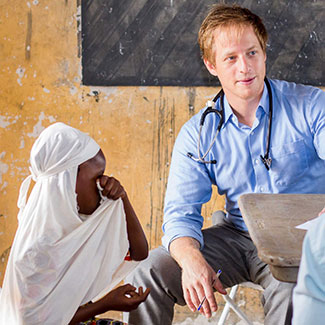Profile: Fogarty Fellow Dr Cameron Gaskill studies HIV referral patterns in Ghana
November / December 2018 | Volume 17, Number 6

Photo courtesy of Cameron Gaskill
By Shana Potash
Surgical resident Dr. Cameron Gaskill began his Fogarty fellowship in Ghana at a time when research in Africa and elsewhere was showing a higher prevalence of HIV among trauma patients than the general population. Recognizing the potential to identify large numbers of new cases in an emergency department and direct those people to care, Gaskill examined the HIV referral pathway from initial diagnosis in his hospital’s emergency room to treatment in a clinic.
With kits provided by the Ghana AIDS Commission, the research team tested patients as they came for emergency care at Komfo Anokye Teaching Hospital. People who were HIV positive were referred to the clinic for a confirmatory test and then to a provider for treatment.
Using a time-and-motion study design, investigators called participants every week to find out where they were in the process. Researchers noted, for example, the amount of time between hospital discharge and confirmatory testing, how long it took for the results to come back, and the wait time to be seen at a clinic - all with the aim of determining where there’s room for improvement.
“There’s a qualitative portion to this,” Gaskill explained. “We call patients and can find out, ‘Well, I went to the clinic and waited in line all day, but the clinic was too busy.’ And then we talk to the clinic and learn about ways that we can improve visit capacity.”
He said the project’s findings could enhance the hospital’s referral systems, more effectively identify people with HIV and get them into treatment, and help the government decide how to allocate resources.
“The question I get asked most often when I tell people about the project is ‘Why is a surgeon involved in HIV care?’” Gaskill said. “The first goal of this project obviously is to improve the care of HIV patients and their referrals. But the larger implication is that studies of these referral processes should be able to be universally applied to other referral processes,” such as from trauma wards to physical therapy and rehab, primary care or a specialized clinic.
Gaskill, who’s interested in surgical capacity building, trained with mentors from the University of Washington and the Kwame Nkrumah University of Science and Technology (KNUST) and participated in other projects intended to improve surgical care for trauma and cancer patients.
“It’s a great opportunity to be working alongside local surgeons who conduct research that informs their clinical care,” Gaskill said. “We’d operate overnight on a patient with typhoid perforation (an intestinal perforation due to a complication of typhoid fever) and then the next day we’d design a study to assess the surgical repair performed in those patients.”
On the weekends away from the hospital, Gaskill traveled to other parts of the country and worked in clinics to keep his skills relevant. He also met with surgeons at hospitals and tertiary care centers to learn about their research and explore opportunities for collaboration.
Gaskill said his experience with Fogarty’s Global Health Fellows and Scholars Program allowed him to apply the research skills he’s built over the years. He learned to become a better teacher and leader, guiding a team and working across departments. Additionally, he benefitted from the exposure to new situations. “I think it’s hard sitting at home to understand the problems in Ghana,” he explained. “I think I’ll have a much better idea of how to create projects in these environments and how I need to plan my life and my career development, so I can best position myself in global health.”
More Information
To view Adobe PDF files,
download current, free accessible plug-ins from Adobe's website.